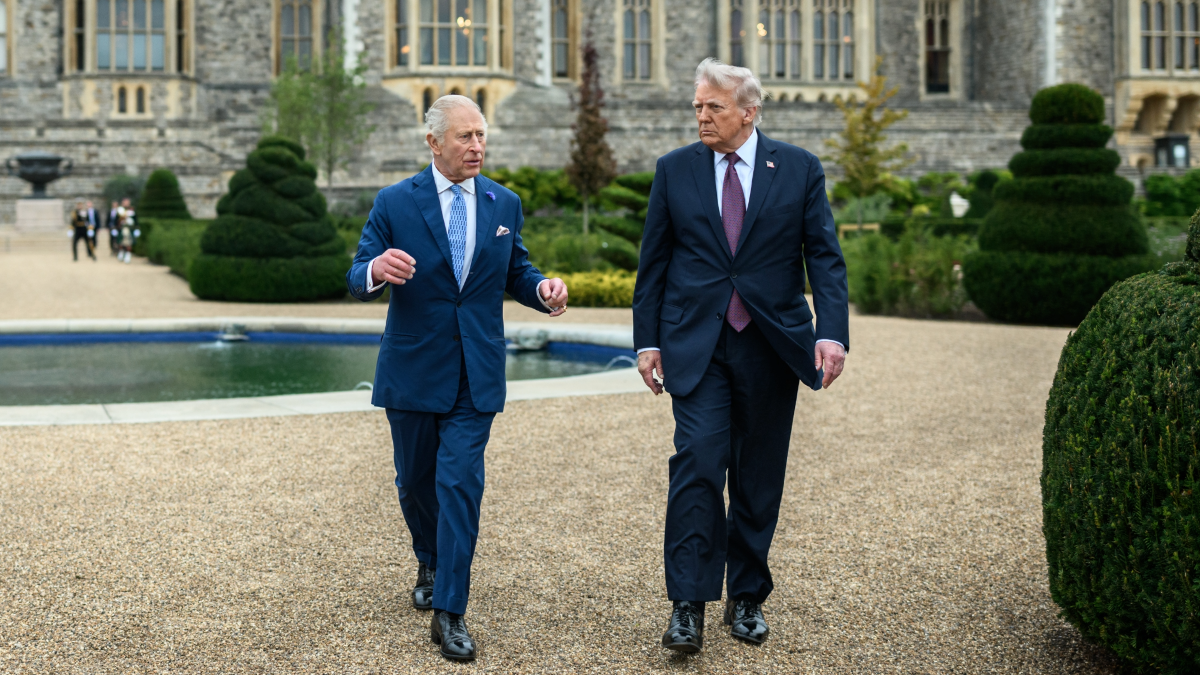'Tech Prosperity Deal' Binds UK to US AI Dominance Strategy
Megan Kirkwood / Sep 18, 2025Megan Kirkwood is a fellow at Tech Policy Press.

United Kingdom King Charles III and United States President Donald Trump at Windsor Caste. Source
The UK is continuing its push to build out massive compute capacity at all costs. As United States President Donald Trump touched down on UK soil on September 16, 2025, on his second state visit, a flurry of tech investments was announced as part of a new UK-US Tech Prosperity Deal. The deal is touted by officials as “developing the fastest growing technologies like AI, quantum, and nuclear” by combining the “resources and expertise” of the two nations. The deal follows from an already growing list of US companies embedding their technology in UK public infrastructure.
The deal includes a combined £31 billion of investment from companies building AI infrastructure, including:
- Microsoft’s £22 billion investment in AI infrastructure, including a commitment to build the “country’s largest supercomputer, with more than 23,000 advanced GPUs, in partnership with Nscale.” This is on top of previous investment commitments.
- Google’s new data center in Waltham Cross, Hertfordshire “as part of a 2-year £5 billion investment in the UK.” This includes a commitment by Google DeepMind to “work with both governments to advise on how scientists can harness the latest AI tools in their work.” Google’s investment also promises to create 8,250 jobs annually at UK businesses.
- CoreWeave’s £1.5 billion investment into AI data center capacity, which the UK government notes brings the company’s total investment in the UK to £2.5 billion over the past year. CoreWeave is partnering with “DataVita in Scotland to build one of Europe’s largest, most efficient AI data centers.”
- Salesforce’s £1.4 billion investment, which followed its “previous 5-year investment of $4 billion made in 2023, bringing the total investment to $6 billion.”
- UK-based company AI Pathfinder’s investment of over £1 billion.
- Nvidia’s commitment to deploy 120,000 advanced GPUs across the UK. On top of this, UK-based Nscale will deploy 60,000 Nvidia GPUs through a partnership with OpenAI to deliver a “Stargate UK” project.
- Trade association techUK is also collaborating with Nvidia, “alongside robotics and automation leader Quanser and training provider QA, to deliver a program that connects its members, robotics researchers, and startups with funding, training, and industry collaboration opportunities to make the most of AI.” This follows two Memoranda of Understanding signed by the UK government and Nvidia to support “the development of a nationwide AI talent pipeline and accelerating critical university-led research into the role of AI in advanced connectivity technologies” and Nvidia’s AI lab expansion commitment. It also follows a £187 million government ‘TechFirst’ program backed by various companies, including Nvidia.
- Scale AI’s £39 million investment.
- BlackRock’s £500 million investment in data center expansion.
These deals do not stand alone, as Amazon, CoreWeave, Oracle, Salesforce, Cohere, Anthropic, and Microsoft all previously announced investment commitments or support for the UK’s AI growth strategy.
Ensuring private interests prevail
What this deal makes clear is just how much the tech broligarchy is dictating the state of play. Indeed, Trump will be accompanied by an assortment of Big Tech representatives on this trip, including Nvidia CEO Jensen Huang, OpenAI co-founder and CEO Sam Altman and Microsoft CEO Satya Nadella, all of whom play an outsized role in the UK’s national strategy.
Nvidia
Huang has already made clear his vision that “every industry in the UK will be a tech industry.” Nvidia stands to gain from a close relationship with state leaders seeking to deploy intensive compute, considering it holds “between 70% and 95% of the market share for artificial intelligence chips,” illustrating how the company is poised to benefit from a data center boom. To ensure the continuation of its dominance, it is within the company’s interests to deploy the kind of AI training programmes announced above so that developers and AI companies remain accustomed to its technologies and platform.
OpenAI
OpenAI has left its fingerprints all over the Tech Prosperity Deal. Particularly of note is the promise of a Stargate UK project, which would expand the US Stargate Project. Thus far, the Stargate Project has involved various companies pledging huge amounts of capital to build domestic computing infrastructure in the vague hope of powering Artificial General Intelligence, which remains an undefined benchmark that tech leaders pin their hopes on providing god-like levels of wisdom.
OpenAI maintains significant influence in dictating the focus of the UK’s AI strategy, following a non-binding partnership between the company and the UK government. In it, the agreement lays out a worryingly wide scope of influence that the company has over the direction of AI in public services, as well as directing both the infrastructural build-out of compute power and directing future research. Some of the outcomes of this agreement are already apparent. For example, following OpenAI’s pledge to diffuse AI across government departments, the UK’s Ministry of Justice staff now have “access to a MOJ-secure version of Copilot Chat, with tools that help with tasks like drafting, summarising, and analysis. We are also rolling out premium versions of Copilot and are the first department to pilot ChatGPT Enterprise.” This is part of an effort to “embed AI across the justice system,” and follows similar announcements across other departments.
Perhaps significantly, OpenAI’s previous governance lead, Jade Leung, has been appointed as the new AI advisor for the UK following the departure of Matt Clifford. Leung also leads the UK’s rebranded AI Security Institute. In OpenAI’s agreement, the company confirms its intention to collaborate with the institute in protecting the public, though the institute focuses more on hypothetical problems arising from autonomous systems, rather than user safety. Leung is expected to split her time between the institute and consulting with the prime minister on AI, giving OpenAI further opportunity to influence policy.
Microsoft
I previously reported on Microsoft’s investment in the UK’s industrial strategy. The chief executive of Microsoft UK, Clare Barclay, is the chair of the Industrial Strategy Advisory Council, providing “advice to the government in partnership with businesses, unions and other stakeholders.” Microsoft also provides UK public organizations with access to its portfolio of cloud software and services. Indeed, the Department for Science, Innovation and Technology has recently touted the time savings gained by using Microsoft services like Copilot, in an effort to steer widespread adoption, although claims of productivity increases have been called into question when looking at the small print of such trials.
A market investigation by the UK’s Competition and Markets Authority (CMA) has found that Amazon’s AWS and Microsoft are the largest providers of cloud services in the UK. As one of the “big three” in the global cloud market, the expansion of data centers and the increase in AI demand that the UK is pushing for will be hugely beneficial to Microsoft. AI Now Institute's Kate Brennan, Amba Kak, and Sarah Myers West write that “cloud firms are incentivized to boost AI demand either way, ensuring that AI demand balloons to fit a growing market for infrastructure that depends on its success.”
However, the CMA’s investigation recommended designating Microsoft under its new digital competition law and imposing remedies to weaken the highly concentrated cloud computing market. Mark Sellman asks in The Times what might be leveraged in exchange for these tech deals, pointing in particular to the CMA’s new pro-growth agenda and new business-friendly chairman. He acknowledges that tech companies want regulators to leave them be, and previously, the prime minister has been willing to intervene in the running of the independent regulator. Though some of the finer print of the US-UK deal remains to be seen, will the cloud giants be left to maintain dominance in exchange for compute power? Will their increasing infrastructural importance shield it from interventions designed to weaken their power?
The UK further aligns with the US
It is clearer than ever that the UK is not pursuing any kind of meaningfully “sovereign” tech sector. Instead, the UK is tying itself to the US, which has equally made clear its intention to “establish American AI—from our advanced semiconductors to our models to our applications—as the gold standard for AI worldwide and ensure our allies are building on American technology.”
The UK appears happy to go along with this plan. While the EU is reconsidering its relationship with the US and pushing for increased sovereign control over its ability to enforce its laws and encourage a domestic tech sector, the UK is happy to cede control of its land and public services in the search for economic growth. But this ignores the reality that these deals are merely allowing US companies to build their infrastructure on UK soil in order to deploy their own technology. Vague promises of productivity gains have so far been unfounded, job creation has often been a broken promise, and the environmental toll of data centers is disastrous. What the UK actually stands to gain remains unclear.
Authors
